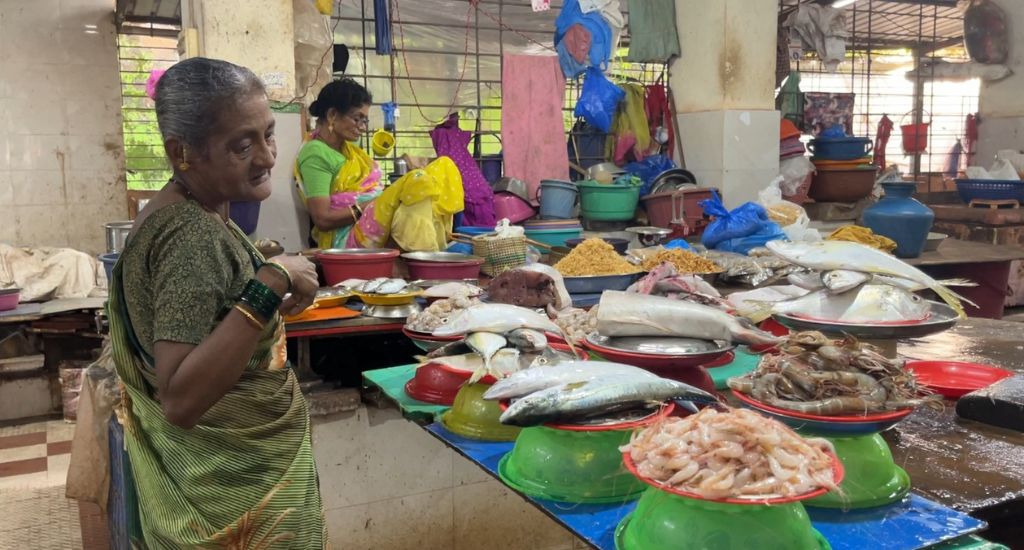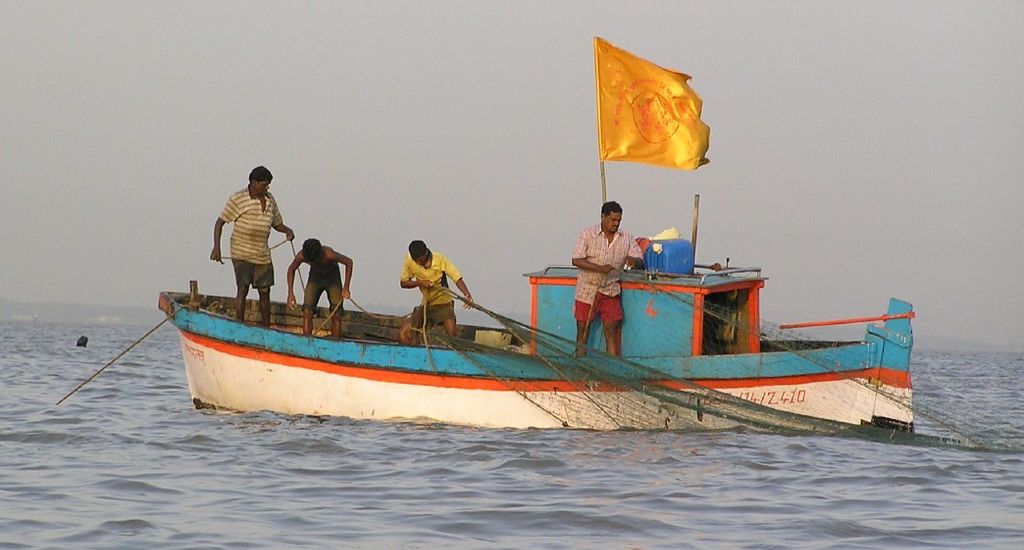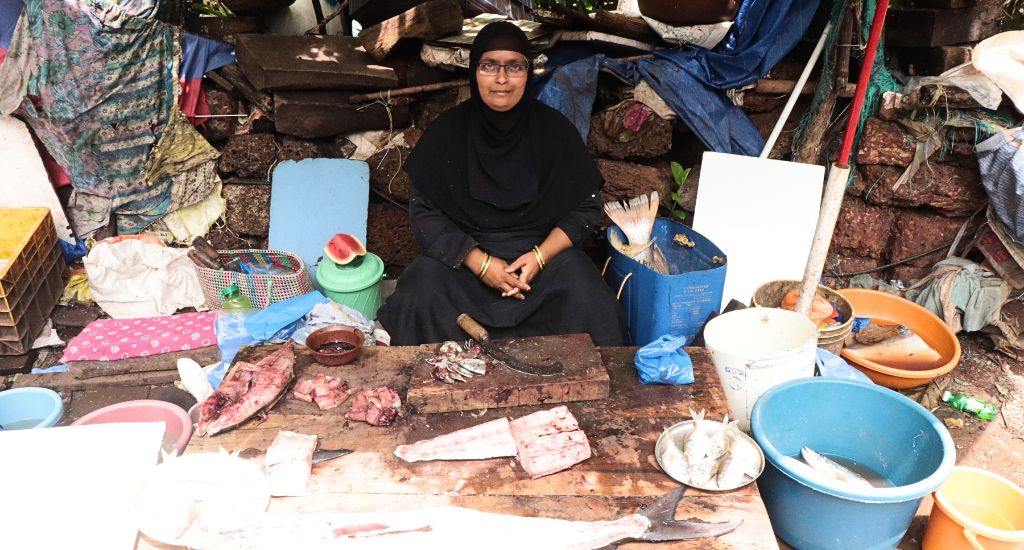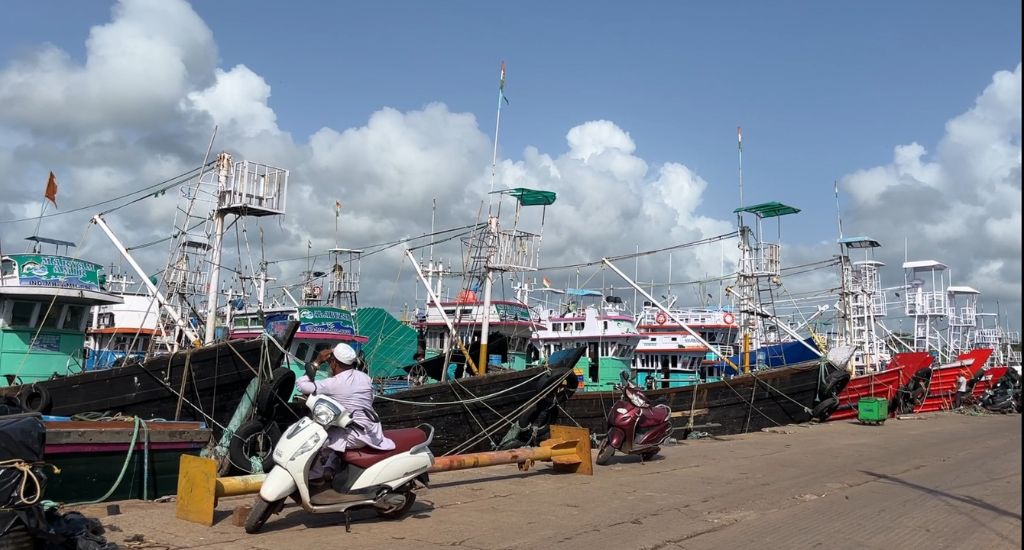
Maharashtra fisherwomen in deep water due to climate change
Fishers in Maharashtra’s Konkan coast, especially the women dependent on fishing, face hardships as the fish catch declines due to rising sea levels and marine pollution.

Fishers in Maharashtra’s Konkan coast, especially the women dependent on fishing, face hardships as the fish catch declines due to rising sea levels and marine pollution.
Every day, Nazia Shaikh (name changed), a 59-year-old fisherwoman from Rajiwada village in Ratnagiri district of Maharashtra, ventures out of her house in the wee hours. Her entire family is involved in fishing. For nearly 25 years she has been making a living by selling the fish catch her family manages to bring.
“Until a few years ago, fishing and allied work brought a good income for local communities like ours. But with unpredictable weather, rough seas and increasing pollution, we are struggling to make ends meet. We often discuss the possibility of the fish disappearing from the sea one day,” said Shaikh as she laid down the catch of the day on a wooden plank. Her hands and feet were sore from working long hours.
“The catch is not good on most days. We have to sell what we get but the earnings are so low that we don’t even recover our investment,” she added.
Shaikh’s story is just a symptom of a larger crisis that hundreds of fisherfolk in Ratnagiri and other coastal regions in the country are grappling with: climate change and its impact on their livelihood.
Research shows how climate change is linked to the fish stock, and also sounds warning bells for the years to come.
Also Read: Maharashtra village strives to preserve ancestral fishing practices

According to Swapnaja Mohite, the head of the Department of Fisheries Science at the Government Fisheries College in Ratnagiri, the alarming levels of carbon dioxide in the oceans due to accelerated global warming pose a major threat to marine species.
“The increasing carbon dioxide levels lead to acidification of seawater, resulting in the formation of carbonic acid. This leads to a depletion of oxygen in certain regions, forming ‘dead zones’, where marine life either perishes or migrates elsewhere,” said Mohite.
The rising levels of carbon dioxide and water pollution due to effluents from factories also lead to mortality of marine life including algae and phytoplankton which are food for many fish species. Research by Mohite’s students indicates that 79 marine species are currently endangered around the Konkan belt.
The Konkan region’s coastline spans about 720 km. With its diverse range of creeks, connecting seas and coastal areas, fishing is the predominant occupation in the region. An estimated 17 lakh people are engaged in fisheries along the coastline.
Also Read: Reviving humpback mahseer in Cauvery’s hidden world

Women contribute approximately 70 percent of labour in the post-fishing process which includes sorting and selling the catch. Declining fish production has a direct impact on the women whose livelihoods depend on fishing and allied activities in the region.
Most women in Mirkarwada – a colony in Ratnagiri that houses marginalised people – have been involved in fishing-related activities for nearly 30 years. They work in fish cleaning businesses or in fish processing companies and ice factories.
The decline in fish catch over the last 5-6 years has made life tougher for these women. They have to work longer hours, face more uncertainty and bear the double burden of the economic hardships in their families.
“Fish cutting used to be a significant part of the fishing business, wherein women used to earn Rs 20 for cutting one kg of fish,” said Sharada, a resident of Mirkarwada who has been cutting and selling fish for many years. “But with the reduced availability of fish and decreased purchases from wholesalers, we barely make any money despite working long hours.”
In the households that are predominantly engaged in fishing and related activities, the everyday struggle to make ends meet and the anxieties that come with it hit women and young girls the most.
Families are keen to get their daughters married at a very young age with the hope of reducing the family’s financial needs. Many girls drop out of school as they are forced to work and support their families. Once married, they are often vulnerable to domestic violence.
While almost everyone is affected, the smaller and marginal fisherfolk are hit the hardest.
Also Read: Fin following: Gaga over golden mahseer

“Fishers who have resources to buy bigger motorised boats can venture deeper into the sea and also catch more as they do not fish manually. Small fishers like us suffer a lot as we don’t have the resources to buy expensive equipment,” said Shaikh.
Fisherwomen in Ratnagiri now wish to explore other livelihood options in the hope of earning at least well enough to feed their families. Many of them are now forced to resort to menial jobs to make ends meet. Many women have started working in low-paying, daily wage jobs such as construction work which is labour intensive.
“We are desperate to do any work that gives us money. We don’t want our next generation to stay in this profession. Nobody should go through the hardships that we face,” said Sopannabi Sheikh, a 61-year-old fisherwoman from Dapoli.
Also Read: This venture is all about Konkan coconuts
The lead image at the top shows the fish market in Ratnagiri, where women are predominantly engaged in selling and cutting fish. (Photo by Rushikesh More)
Kashi Vinod, hailing from Ratnagiri, has been involved in various grassroot biodiversity protection movements in the Konkan region. She is currently a community reporter with Baimanus, a media platform that works with grassroots women in Maharashtra. This story, written in Marathi under Project Dharitri – a reporting project on gender and climate change – was translated by Ankita Bhatkhande, who works as Head of Communications-Gender and Climate, Asar Social Impact Advisors.